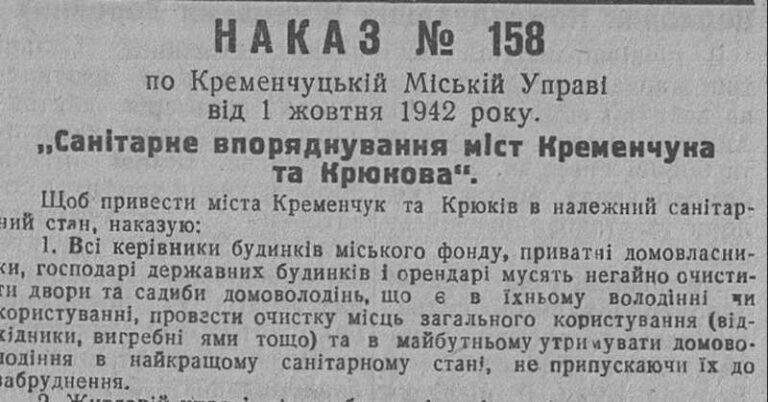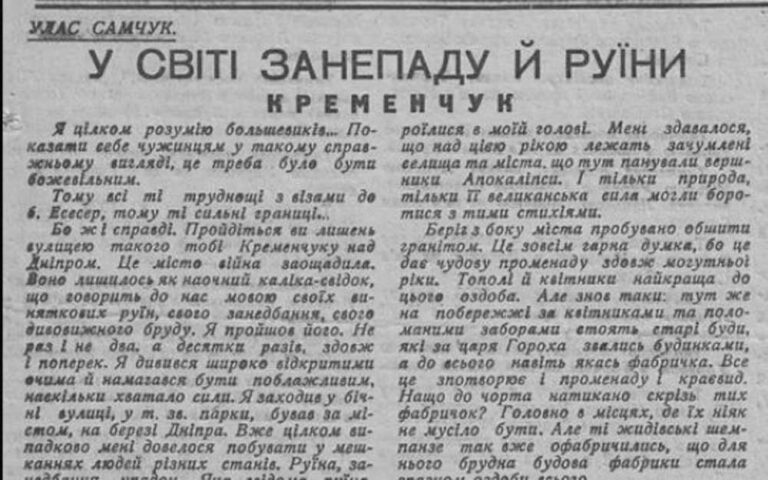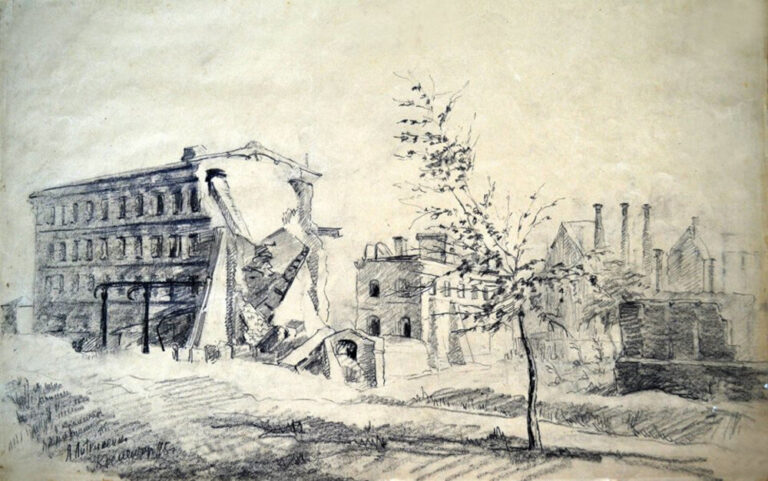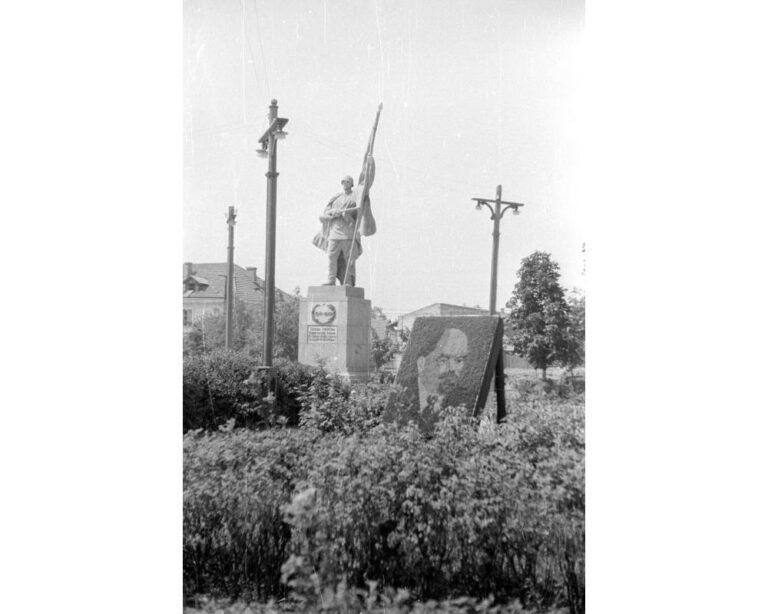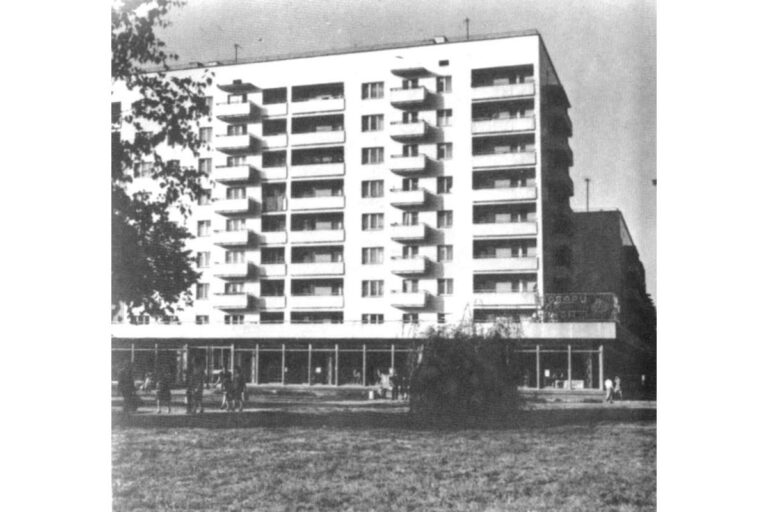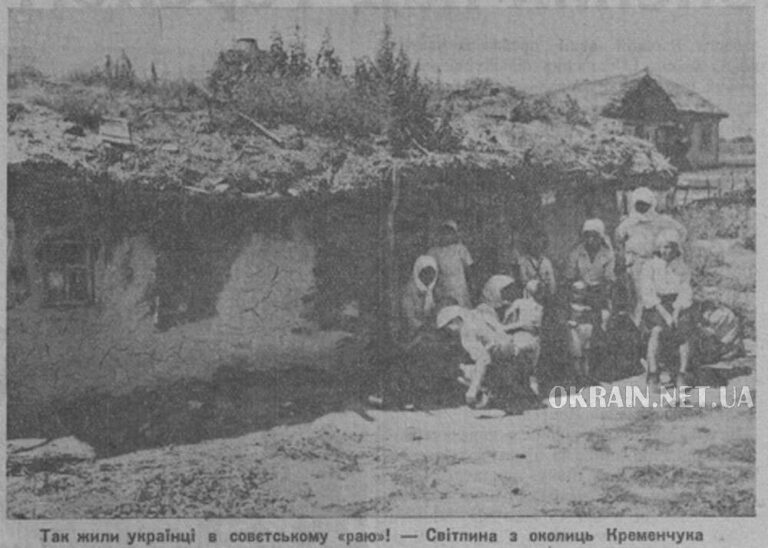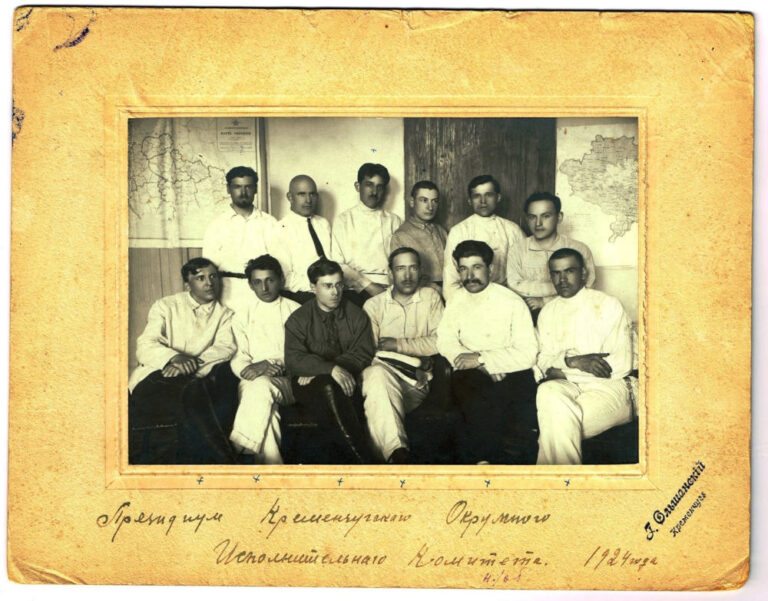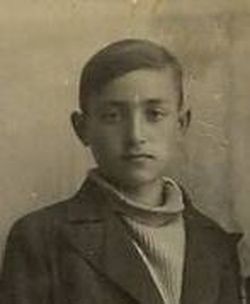
L.I. Evselevsky
In all the textbooks of the Soviet period it is written that the party and the government organized the evacuation to the East. In fact, if plants and factories were dismantled, loaded and most often had a departure address, then the civilian population, having received a certificate, and most often without it, went without knowing where and where to stay.
On August 9, after the intensive bombing of Kremenchug, the population of the city moved east. My father was at work. The elder sister with a detachment of young people built landing strips at the airfield. Together with a sick mother, we set off. We were given a certificate on tissue paper that we were evacuating. There was no money. I walked barefoot, carrying a small bundle with clothes over my shoulders.
I still can’t imagine how my mother decided to go on such a journey without money. I understand she saved me. An endless stream of people walked along the Poltava road towards the village of Omelnik. German planes at low level fired at our column. Many people died. Nobody stopped. Suitcases and bundles remained on the road and on the side of the road. They were not selected. In the evening we reached Omelnik. I remembered that my father and I, when he worked in the district, visited the orphanage, I remembered the director of the orphanage, Ivan Kupriyanovich Teplyk. I found the orphanage and the director, told me what situation my mother and I were in. He said that the orphanage with the children and the household was leaving Omelnik tomorrow morning, and my mother and I could move with them. We were fed.
In the morning with the orphanage we set off. Mom was put on one of the carts, and I went on foot with my peers. At the ferry crossing, we crossed the Psel and moved to the Reshetilovka station. There we parted ways with the orphans. I can’t forget their kindness and help. They gave my mother and me a loaf of bread, cheese and a piece of lard. With this stock we remained at the station. A train with equipment and open platforms approached. On one of them, despite the cries of those accompanying me, I put my mother on it and climbed in there myself. The composition moved. I understood that the equipment was being transported to the East. At each station, the people on the platform were supplemented. We drove slowly. Often the paths ahead were repaired, and then people went to the nearby villages to change what they had for food. They kindled fires, roasted clothes, I can’t understand where so many lice came from. The train was bombed several times. Luckily, they never made it into the squad. With this echelon we got to Rostov-on-Don. It was announced that this train would be waiting for the rest of the cars of this plant. There was an evacuation center in Rostov. It was located near the train station. Mom and I registered there. We were given coupons for food and put on a train bound for Krasnodar.
In Krasnodar, at the distribution point, we were offered to go to the village of Novotitarovskaya. From the village came a cart for people. Apart from me and my mother, no one else wanted to go there. On the Kuban steppes we went to the village. The driver brought vegetables to Krasnodar and was pleased that there were fellow travelers on the way back. There was about 25 km of dirt road to the village. The driver – grandfather Grigory (Grytsko) – sang Ukrainian songs all the way. And his speech was more Ukrainian than Russian. We stopped near the village council. The chairman of the village council summoned one housewife and asked to take us temporarily. She gave us a room. The hostess’s ancestors were from Ukraine. This was evident from the decoration of the rooms, where very beautifully embroidered towels hung. There were many Ukrainian words in her speech, and she was dressed like women in Ukrainian villages. The owner’s brother, Stepan Kondratievich, was the director of Zagotzerno. In the evening he came to her. I talked with my mother for a long time. He asked where we were from, how we got there, how many people had left their homes. Having learned that we were from the Poltava region, turning to his sister, he said: “Katya, our ancestors came to the Kuban from the village of Manzhelia, which is located on the banks of the Psla, in the Poltava region. Fellow countrymen need to be accepted in our way, in the Kuban way. I visited there after the famine of 1932-1933. All as grandfather said. The same huts-huts under straw and reeds. As we Kuban in the collective farms, and there. They live in poverty. And what kind of wealthy peasant Cossacks were in Manzhelia, according to the stories of my grandfather.
Stepan Kondratievich was a very kind person and figured out how to support my mother and me financially. The next day I went to work at Zagotzerno. I was assigned to help the warehouse manager. It was my duty to make sure that the collective farmers carefully poured out the grain that they brought. They treated me to watermelons, melons, fruits.
The school year began in September. The teacher came to enrol me in school. I said that I can’t go to school, we don’t have anything and what we will eat. I thought that we would soon go home and there I would continue my studies. The next day I was invited to the stanitsa council. The chairman gave me a sealed letter to the head. the regional department of public education. With this letter, I went to Krasnodar. The head of the oblono was a woman dressed as N. K. Krupskaya, in a long skirt and a knitted blouse. She read the letter, talked to me and offered me
direction to the orphanage. I refused, because I could not leave my sick mother. I asked, if possible, to give me trousers and boots. She wrote a note and explained how to find the warehouse of the department of public education. The warehouse gave me boots, trousers, a shirt, socks, and two pairs of shorts. When I left the warehouse, the woman who gave me everything called me and gave me an undershirt and underpants. The Cossacks of the village dressed their mother. I remember one portly Cossack woman brought her mother a knitted woolen blouse and talked with her mother for a long time.
So, surrounded by good villagers, my mother and I lived. We hoped that the Red Army would soon go on the offensive and we would return home.
But, unfortunately, the summary of the Sovinformburo was not encouraging. And when it was reported that the Nazis crossed the Dnieper and captured Kremenchug, they realized that they would not be able to return home soon.
I made friends with the local boys. A neighbor’s boy of my age, Vitaly, showed his birth certificate, which indicated that he was a Cossack. One Sunday, when his parents left for the market, he called me, opened the chest and began to show Cossack clothes: Circassians, bloomers, hoods, the orders of his grandfather and great-grandfather. For the holidays he had a Cossack uniform.
Several families of immigrants from the central regions of Russia lived in the village. They were resettled during the famine of 1931. Their families were large with ten or more children. The boys of the Cossack families were not friends with their children, they were at enmity.
Disturbing news came from the front. The Nazi army moved further and further east and south. The Germans were approaching the Kuban. Stepan Kondratievich came to us in the evening. Talking to my mother, he said: Sonya, it’s a hard time. Echelons with people and equipment go deeper… Take the guy away, it’s not safe to stay here. I did not want to believe that the Nazis would capture this Cossack region.
Unfortunately, the Novo-Tatarovskaya village was not the last point of our evacuation. It was hard to leave the region and the people who sheltered us and showed us so much kindness.
We plunged into one of the trains standing at the station, it was going to Makhachkala. We got to Makhachkala, and there were thousands of refugees. We could only be sent by boat. There was no boarding for trains going to Baku. The station was guarded. We were in Makhachkala for several days. We were at the pier all the time. It is hard to imagine how we managed to board the ship. The ship was coming from Iran. There were food in the hold. We were placed on deck. When they moved away from the pier, the pitching began. Many tore, cried. The picture was terrible. It began to storm. The deck was flooded. Many people were washed away by a wave of things. The captain gave the command to place people in the hold. But many people, along with their belongings, were swept into the sea. Mom and I were lucky. We survived. The ship arrived in Krasnovodsk.
Krasnovodsk in November 1941. Thousands of people on the station square and on the shore. There is no bread, and they don’t sell it. There is no drinking water, it is brought in by tanks. For a fantastic amount, having access to a water tank, they sell water for glasses. On the fourth day, hungry with a strong thirst, we were put into closed cars and the train started. At some stations, water was brought to the cars, and whoever had time could get a little of it. At the entrance to Ashgabat, on sidings, there were armored trains. Everyone was given bread at the Ashgabat station. We were practically not let out of the wagons, since Ashgabat was closed to refugees. The train moved on. So we arrived in Samarkand.
The material was prepared by A. L. Evselevskaya from the personal archive of L. I. Evselevsky
Part 2 – Evacuation from Kremenchug. Samarkand.
Part 3 – Evacuation. Return to Kremenchuk
